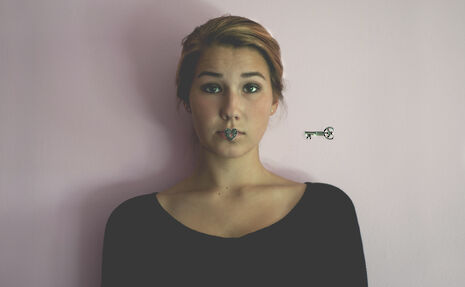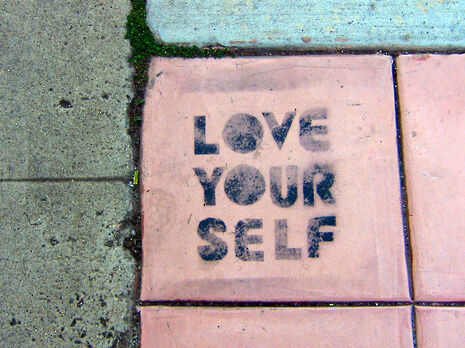Disability and desire
Exploring how to feel loved when you find it impossible to love yourself

“So, we’re autistic” said the man on the screen, flatly. I played the clip over and over again, searching for the joke. “So, we’re autistic.” “So, we’re autistic.” The meme was a clip from the show The Undateables, and it had surfaced on my news feed because someone I’d recently hooked up with had liked it. I typed out various increasingly explicit formulations on the response “Undateable? that’s not what you said the other night” before deleting them and throwing my phone across the room, furiously wiping tears from my eyes and a warm wave of familiar self-disgust churning through my stomach.
Confession: the main reason I don’t tell anyone about being autistic is that it isn’t very sexy. Disability in all its forms is utterly desexualised in our society – autism particularly so, in part due to its inaccurate representation as something which primarily affects young children. Autistic characters don’t have sexual relationships unless their clumsy attempts at doing so are a source of comedy for neurotypical viewers. We are “undateable.”
Young autistic women exist in a strange and dangerous contradiction. Young women are taught their primary value is their sexual attractiveness; disabled people are constantly publicly desexualised. As a result, I spent much of my teenage life obsessively chasing something which would always be, by definition, just a little out of my reach.
No matter how hard I worked to look pretty enough, sound smart enough, deliver flirty and funny enough comebacks, something about me still felt inherently undesirable. I cut my hair a different way every few months and saved my school lunch money for fake nails, a rainbow of lipsticks and boxes of hair dye in bright red, peroxide blonde, jet black, pastel pink and chocolate brown, hoping that one day I’d hit on some magic combination of chemicals that erased what felt like a ugly, rotten core.
Like many young women who've always felt something was a little out of place, I was drawn to fourth-wave feminism's mantra of self-love and body positivity like a moth to a bulb. But while I saw women around me flourish in these spaces, they weren't what I was looking for. In fact, as a slim, white, blue-eyed blonde, I am slightly incongruous in them; women who look like me are already constantly validated as being physically attractive. My sense of inadequacy hadn't been coming from my body; conversely, I realised, I had been using making my physical self look as good as possible in order to to compensate for the insecurity I felt about my disability. When your insides feel uglier than your outside, the concept of inner beauty just makes you feel worse.

It's not hard to predict how this deep-rooted sense of undesirability can manifest in unhealthy relationships. While the logical, stridently feminist, #StrongIndependentWoman side of me knows to take no shit from creepy men who feel entitled to my body, there is a part of me, larger and more influential than I'd like to admit, which feels someone like me should be pathetically grateful for sexual or romantic attention. Even when it comes to full relationships, it's still very difficult for me to separate genuine attraction to a man from intense gratitude at his interest in me. Whether it's likes on a selfie or a series of incredibly inadvisable involvements with boys I should theoretically despise, I am constantly looking for ways to compile quantifiable proof that I am desirable.
Women with invisible disabilities struggle with sex and relationships in many different ways; some of us become terrified of engaging in sex or dating at all; some of us attempt to fill our deep sense of inadequacy with as many flings and one night stands as possible. Some of us become prime targets for abusive relationships due to our predisposition to self-doubt and our fear that nobody else will accept us; some of us hold partners at arms length or self-sabotage as quickly as possible, fearing that if anyone gets close enough to find out what we're really like they will be repulsed and hurt us more.
It sounds like a cheesy platitude, but you can't conduct healthy relationships when you don't truly believe that anyone could ever be in love with you, and you can't believe that anyone could be in love with you until you've learned to love yourself. It's hard to do this when you've only ever seen people like you degraded and mocked for their efforts to feel wanted. A lot of the people cracking jokes about your disorder will have no idea how many brilliant, captivating, engaging disabled people they've been attracted to. If that makes you “undateable” to them? Their loss.
 News / Lord Mandelson visits University30 June 2025
News / Lord Mandelson visits University30 June 2025 Comment / Why shouldn’t we share our libraries with A-level students?25 June 2025
Comment / Why shouldn’t we share our libraries with A-level students?25 June 2025 News / Academics lead campaign against Lord Browne Chancellor bid2 July 2025
News / Academics lead campaign against Lord Browne Chancellor bid2 July 2025 Features / 3am in Cambridge25 June 2025
Features / 3am in Cambridge25 June 2025 News / John’s students call on College to divest1 July 2025
News / John’s students call on College to divest1 July 2025








